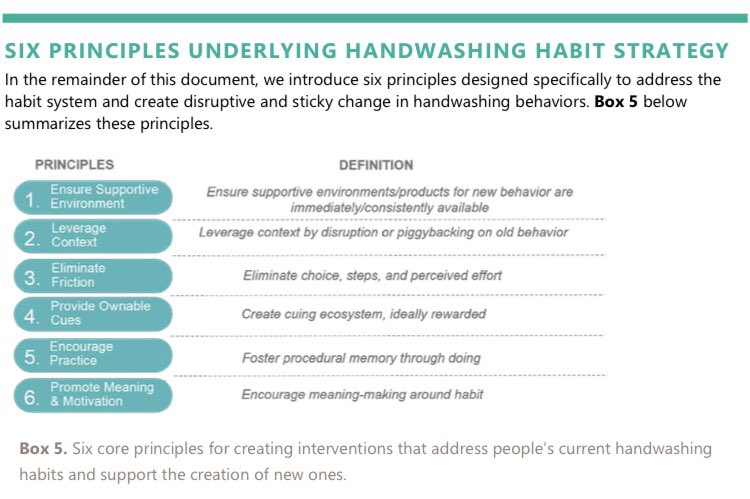As the evidence for public #facecoverings becomes clearer, I wonder if mandating it will be enough (anecdotally, on public transport where it’s mandatory already, I observed about 50% wearing masks at the weekend). Mass adherence will need a behaviour change science effort. /1
I used to work in handwashing behaviour change. Asking the public to engage in behaviours to reduce #covid19 transmission has parallels. Mandating these behaviours is important, not least by bringing some much-needed clarity of expectation. But probably won’t be sufficient. /2
Not everyone will adopt a behaviour because they are ‘told to’. Research in handwashing finds other factors are important, including: knowledge, risk beliefs, psychological trade-offs, sociodemographic factors, social norms, and access to the items needed to enact a behaviour. /3
This means that for an effective behaviour change intervention, we need to address the different motivators that chime with different people. In handwashing, research tells us the most impactful are emotional motivators, especially: disgust, nurture, status, and affiliation. /4
You might think fear would be a great emotional motivator. Yes and no. Research in handwashing shows this behaviour change tends to be temporary. Other emotional motivators have a longer-lasting impact.(Maybe why people in my neighbourhood who wore masks last month now don’t.)/5
The other important factor is habit. A habit is an automatic behavior that is perceived as second nature. Making something a habit is really important for making a behaviour stick long term. /6
So three main factors help kick off an action (like washing hands or wearing masks): 1. Social norms (people seeing peers/family doing the action), 2. Emotional motivators (eg protecting the NHS, or your family members/feeling affiliated to a role model), 3. Environmental cues /7
But then it needs to turn into a habit if the behaviour is to stick beyond the initial novelty phase. Research tells us around 45% of human behaviour is habit. There are 6 principles in getting a behaviour to turn into habit and stick. Here we go. /8
1. Ensure a stable, supportive environment - contextual cues and products for new behavior must be immediately and consistently available in physical settings where behaviour is to occur, eg handwashing stations, masks etc. /9
2. Leverage context, ie piggyback on other behaviour changes associated with the context of Covid19. 3. Eliminate friction (choices, perceived effort etc) so decisions don’t have to be made. 4. Establish context cues (eg approaching a shop-don face covering) /10
Part of 4 is rewards - feeling good about your action, social approval, disease avoidance etc). 5. Develop procedural memory by repeating a practice. 6. Develop personal meaning around the habitual behaviour. /11
When I worked in handwashing we published this paper by David Neal and colleagues on habit formation that summarises how to turn a behaviour like handwashing or face coverings into a habit. Doing so is likely to be important for the UK. http://www.washplus.org/sites/default/files/resource_files/habits-neal2015.pdf">https://www.washplus.org/sites/def... /12
I’ll end by saying that to maximise public health impact on the wearing of face coverings AND handwashing, make it easy and desirable to do it, not just mandatory. /13

 Read on Twitter
Read on Twitter


